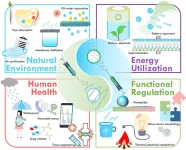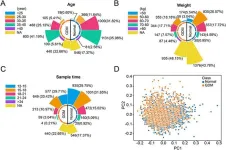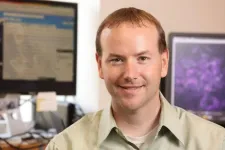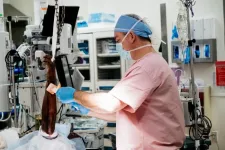(Press-News.org) (Boston)—Sabrina A. Assoumou, MD, MPH, the inaugural Louis W. Sullivan, MD, Professor of Medicine, and an associate professor of medicine at Boston University Chobanian and Avedisian School of Medicine, has been selected to serve in the 2024-2026 cohort of New Voices in Sciences, Engineering, and Medicine at the National Academies. Participants are selected in recognition of outstanding achievements and the program provides an opportunity to identify and address pressing concerns for the nation.
New Voices in Sciences, Engineering, and Medicine is a cohort-based leadership program that promotes collaboration among outstanding early- and mid-career scientists, engineers, and medical professionals during a two-year term of service. The program aims to expand the diversity of expertise engaged in the convening and advisory functions of the National Academies while building a network of emerging U.S. leaders to address national and global challenges.
Assoumou is an attending physician in the section of infectious diseases at Boston Medical Center (BMC). She is a clinician-investigator who cares for patients with human immunodeficiency virus (HIV). Her research focuses on medical complications of substance use including HIV and Hepatitis C virus (HCV). She is also interested in models of care and on improving the continuum of care for individuals with HIV and/or HCV. She is currently the principal investigator on National Institutes of Health (NIH)-funded research to increase HIV prevention.
Assoumou has published in multiple high impact journals including JAMA, Annals of Internal Medicine, AIDS and Clinical Infectious Diseases. Her work also informed guidance panels from the Centers for Disease Control and Prevention and the Infectious Diseases Society of America. Assoumou has also presented her findings at the National Academy of Sciences to the panel tasked with developing a National Strategy for the Elimination of Hepatitis B and C.
Assoumou graduated magna cum laude from Williams College and obtained her medical degree from the University of Rochester School of Medicine and Dentistry. She then completed a combined Internal Medicine/Pediatrics residency at Brown University and an Infectious Diseases Fellowship at Harvard University’s Beth Israel Deaconess Medical Center where she was awarded the Finland Award for Research Excellence. She also earned an MPH from the Harvard T.H. Chan School of Public Health.
Assoumou received an Excellence in Teaching Hospital-Based Faculty Award at BMC in 2017. She was also recognized as the Distinguished Faculty of the Month in April 2020 for her service to the medical school community in teaching, service on committees and mentoring of students, trainees and junior faculty. The same year she also received a Department of Medicine Evans Junior Faculty Research Merit Award recognizing an outstanding record of scholarship and research. Dr. Assoumou is also a recipient of an Extraordinary Women Advancing Healthcare in Massachusetts Award by The Women’s Edge.
The National Academies of Sciences, Engineering, and Medicine provide independent, objective advice to inform policy with evidence, spark progress and innovation, and confront challenging issues for the benefit of society.
END
BU professor to serve on the National Academies’ New Voices in Sciences, Engineering, and Medicine Program
2024-02-01
ELSE PRESS RELEASES FROM THIS DATE:
The ShAPE of buildings to come: Scrap aluminum transforms recycling life cycle
2024-02-01
RICHLAND, Wash.—The circular economy just closed the loop on scrap aluminum, thanks to a new patent-pending technology developed at the Department of Energy’s Pacific Northwest National Laboratory. That twisted aluminum mesh, those banged up bicycle frames, and the used car parts now languishing in junk yards could gain new life as building structures such as door and window frames, facades, lighting, decorative features and a myriad of other uses—all while conserving nearly all the energy required to manufacture new aluminum products.
It’s no secret that strong, yet light-weight aluminum parts are being ...
A positive spin—electrospinning and electrospraying synergism for the nanomaterials industry
2024-02-01
Combining these two twins-tech, electrospinning and electrospraying, to fabricate novel nanomaterials is an urgent area of research for materials scientists and biomedical engineers, according to a new paper by Professor Hu Jinlian of City University of Hong Kong (CityUHK) published in Matter, a highly respected monthly journal encompassing materials science, from nano to macro, and from fundamentals to application.
The electrospinning and electrospraying synergism (ESS) can positively impact diverse sectors, from bioengineering and ...
cfDNA sequencing enhances non-invasive early detection of gestational diabetes
2024-02-01
Gestational diabetes mellitus (GDM) is a prevalent pregnancy complication posing significant health risks to both mothers and their newborns. Early detection and treatment of GDM are crucial to prevent adverse outcomes. Current screening methods, like glucose tolerance tests, are in after 24 weeks of pregnancy and have limitations in patient compliance and accuracy.
A new study led by Lijian Zhao, Pei Sun, Hui Huang, Nan Li at BGI Genomics in collaboration with the Beijing Obstetrics and Gynecology Hospital, recently published on Briefings in Bioinformatics ...
Promising heart drugs ID'd by cutting-edge combo of machine learning, human learning
2024-02-01
University of Virginia scientists have developed a new approach to machine learning – a form of artificial intelligence – to identify drugs that help minimize harmful scarring after a heart attack or other injuries.
The new machine-learning tool has already found a promising candidate to help prevent harmful heart scarring in a way distinct from previous drugs. The UVA researchers say their cutting-edge computer model has the potential to predict and explain the effects of drugs for other diseases as well.
“Many common diseases such as heart disease, ...
Large multicenter clinical trial finds that antiseptic containing iodine reduces surgical-site infections in patients with extremity fractures
2024-02-01
A large multicenter clinical trial co-led by University of Maryland School of Medicine researchers large multicenter clinical trial co-led by University of Maryland School of Medicine researchers found that an antiseptic containing iodine resulted in about one-quarter fewer post-surgical infections in patients with limb fractures compared to another frequently used skin antiseptic. The results of the study of nearly 8,500 patients across the United States and Canada were published today in the New England Journal of Medicine.
The study – which compared the ...
Jealousy – we understand our own sex best
2024-02-01
We may not always fully understand why our partners get jealous, and women and men often get jealous for completely different reasons.
Two researchers from the Norwegian University of Science and Technology (NTNU) decided to investigate whether people also know about these distinct differences between the sexes.
“What do people think triggers women’s and men’s jealousy? How well do women understand men’s jealousy, and men women’s jealousy? We wanted to find out,” says Professor Mons Bendixen at the Department of Psychology.
Men are more jealous ...
Hiring the most qualified candidate might be unfair
2024-02-01
WASHINGTON — Both liberals and conservatives are more likely to believe that merit-based hiring is unfair after learning about the impacts of socioeconomic disparities, according to a study published by the American Psychological Association.
People from across the political spectrum also are more likely to support programs that encourage socioeconomic diversity after learning about the effects of social class and low income, according to the research, published online in the Journal of Experimental Psychology: General.
“Socioeconomic disadvantages early in life can undermine educational achievement, ...
Excavation of colossal caverns for Fermilab’s DUNE experiment completed
2024-02-01
Excavation workers have finished carving out the future home of the gigantic particle detectors for the international Deep Underground Neutrino Experiment. Located a mile below the surface, the three colossal caverns are at the core of a new research facility that spans an underground area about the size of eight soccer fields.
Hosted by the U.S. Department of Energy’s Fermi National Accelerator Laboratory, DUNE scientists will study the behavior of mysterious particles known as neutrinos to solve some of the biggest questions about our universe. Why is our ...
BIPOC individuals bear greater post-COVID health burdens, new research suggests
2024-02-01
Black, indigenous, and people of color (BIPOC) who were infected with COVID-19 experienced greater negative aftereffects in health and work loss than did similarly infected white participants, new research finds.
Despite similar symptom prevalence, BIPOC and Hispanic patients experienced greater negative impacts on their health status, activity levels, and ability to work compared with non-Hispanic and white patients participating in the ongoing multi-site INSPIRE clinical trial examining people with long COVID.
The findings are published in the journal Frontiers ...
National Academy of Medicine member new president of The Obesity Society
2024-02-01
ROCKVILLE, Md. — A member of the National Academy of Medicine is the new president of The Obesity Society (TOS), the organization announced today.
Jamy Ard, MD, FTOS, is professor in the Departments of Epidemiology and Prevention and Internal Medicine and vice dean of Clinical Research at Wake Forest University School of Medicine in Winston-Salem, N.C. He also co-directs the Atrium Health Wake Forest Baptist Weight Management Center, where he oversees medical weight management programs.
“I am honored to serve as president of ...





